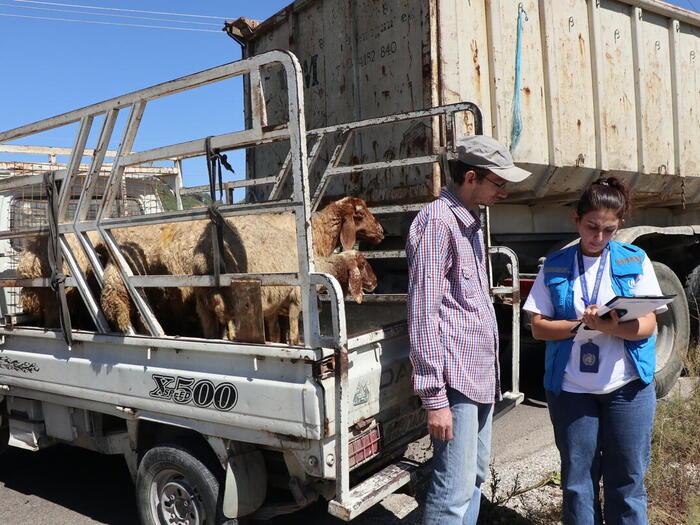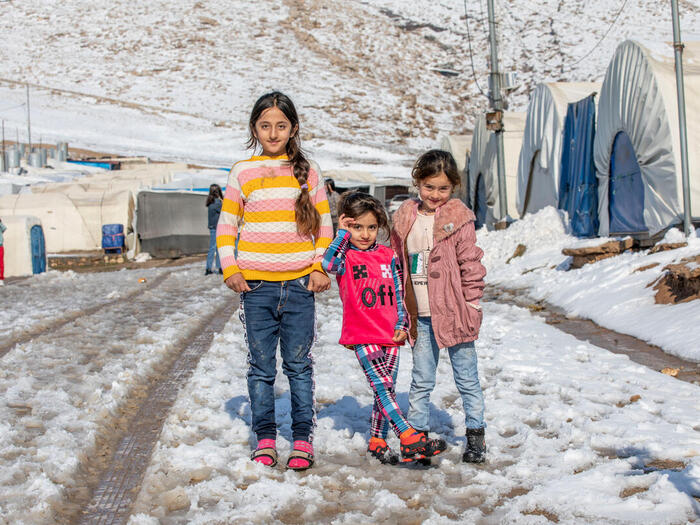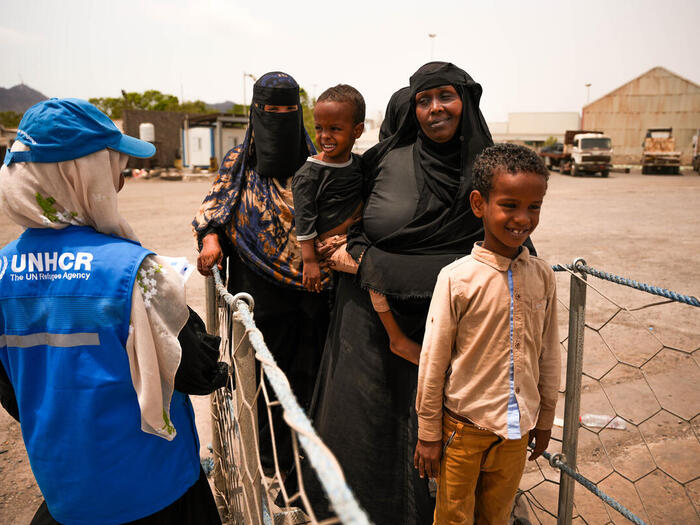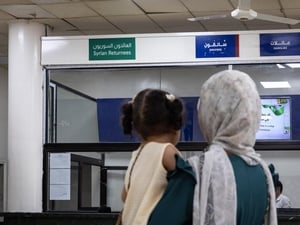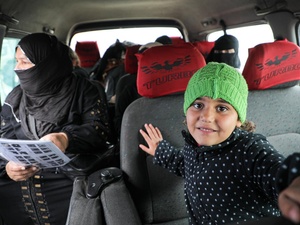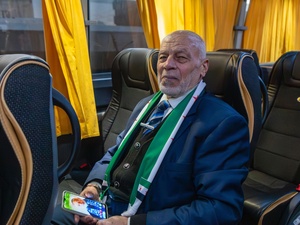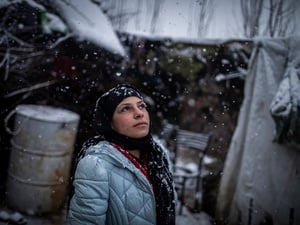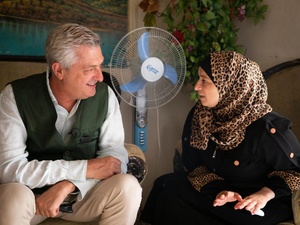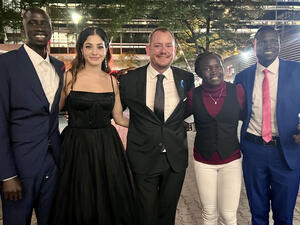Middle East and North Africa
Middle East and North Africa
The humanitarian situation in Syria remains volatile. After almost twelve years of conflict, there are over eight million Syrian refugees in the region and counting.
Elsewhere, violence and instability in countries such as Iraq and Yemen are triggering new waves of displacement. Across the region, our staff deliver life-saving assistance to millions who have been driven from their homes.

Browse country pages in this region:
Do you need help?
Find information and helpful services for refugees, asylum-seekers and stateless persons, read more about your rights and duties, and view the frequently asked questions on the Help page:
See the Help page
Are you looking for a way to study at university?
Find accredited higher education academic or scholarship programmes verified by UNHCR on the Scholarship Opportunities for Refugees platform.
Current emergencies
With around 15.7 million refugees, the Middle East and North Africa accounts for 24% of UNHCR’s budget in 2023, with the majority of funds going towards basic needs, cash assistance and shelter.
The region continues to face economic, political and security challenges, and the needs of the internally displaced, refugees and returnee population remain high. They lack access to basic services and need UNHCR’s support in promoting their self-reliance and integration into national systems and social protection schemes.
The Syria crisis, currently in its 12th year, remains one of the largest displacement crises in the world. Syrian refugees have the highest resettlement needs globally, which remains a critical test of responsibility-sharing by the international community. In Iraq, UNHCR's work is rapidly transitioning from an emergency response to a longer-term development approach and will seek to further strengthen the refugees' economic and social well-being.
Learn more about current emergencies in the Middle East and North Africa and across the world on the Emergencies page.
Text and media 12
Syria emergency
There is no sign of an imminent end to the Syria crisis, which has generated the world’s largest refugee outflows and the largest internally displaced population over the last 12 years. In Lebanon, nine out of ten refugee households now live in extreme poverty.
We provide life-saving humanitarian aid for Syrian refugees, helping the most vulnerable with cash for medicine and other basic necessities, stoves and fuel for heating, shelter kits, protection services and psychosocial support.
Learn more about the Syria emergency here.
UNHCR's work in the region
UNHCR assists refugees with cash and supports their access to health, education, shelter and livelihoods. We aim to maximize the effectiveness and efficiency of cash assistance, one of the most important tools we have for protecting and assisting people.
UNHCR continues to strengthen emergency preparedness and response. We support access to national asylum systems and services, especially with COVID-19 restrictions exacerbating existing challenges. UNHCR uses hybrid and remote processing to identify and register those needing international protection.
Together with partners, we advocate for durable solutions, enabling people to make free and informed decisions regarding their future and promote sustainable returns when possible.
UNHCR also makes efforts to tackle gender-based violence, sexual exploitation and abuse. Within the Regional Refugee and Resilience Plan (3RP) framework, over 140,000 girls and boys in Iraq, Jordan, Lebanon and Türkiye benefited from specialized child protection services in 2021, and 45,000 women and men benefited from parenting support. Strengthening the capacity of UNHCR staff and partners to provide mental health and psychosocial support remains a priority.
Text and media 14
Iraq emergency
Iraq hosts over 290,000 refugees and asylum-seekers, as well as 1.2 million internally displaced people, some of whom face significant barriers to return or to effective local integration.
UNHCR is scaling up its efforts to empower displaced and host communities to become more resilient and better equipped to mitigate protection risks and access solutions. Such efforts include promoting social protection systems, and strengthening their access to public services and employment opportunities.
Learn more about the Iraq emergency here.
MENA Civil Society Network for Displacement
The Middle East and North Africa Civil Society Network for Displacement (MENA CSND) is a network for civil society actors to collaborate and develop common strategies for the protection and support of refugees and host communities in the region.
The platform aims to allow for cross-regional, joint multi-stakeholder advocacy to positively influence public narratives and displacement-related policymaking.
Eradicating statelessness
To prevent and reduce statelessness and identify and protect stateless communities, UNHCR provides legal assistance, seeks improved access to civil documentation, and engages in capacity-building and advocacy, including by promoting every child’s right to a nationality and advancing gender-equal nationality rights.
UNHCR worked with the International Institute for Humanitarian Law on training for government officials and other key interlocutors. We also organized a conference with the League of Arab States on implementing the “Arab declaration on belonging and legal identity”.
Text and media 13
Yemen emergency
Over seven years of conflict have resulted in Yemen enduring one of the world's worst humanitarian crises. Some 23.4 million Yemenis (73 per cent of the population) rely on humanitarian aid for their survival, and millions have fled their homes.
UNHCR is the main agency addressing the protection and well-being of over 98,000 refugees and asylum-seekers across Yemen, mainly from Somalia and Ethiopia, while encouraging other agencies to extend their services to this population.
Through facilities in refugee-hosting areas, UNHCR provides a series of protection services to extremely vulnerable displaced Yemeni, as well as cash assistance to meet their most basic and pressing needs.
Learn more about the Yemen emergency here.
Other reports
Planning for the Middle East and North Africa
The Global Report presents the work carried out by UNHCR in 2021, highlighting the year's achievements and challenges faced in responding to multiple life-threatening crises and ever-growing humanitarian needs.
Reporting for the Middle East and North Africa
Global Appeal provides information about UNHCR’s plans for the coming year and the funding it needs to protect, assist and empower forcibly displaced and stateless people, and to help them find solutions to their situations.


